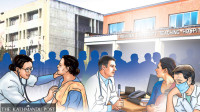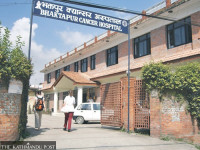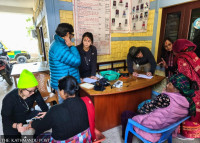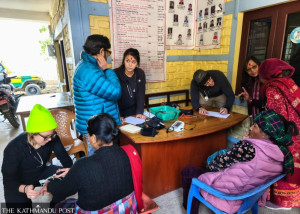Health
Detection of new Omicron sub-variants in India raises concerns in Nepal
Experts say it could be just a matter of days before the virus enters Nepal, due to high mobility between the two countries.
Arjun Poudel
On Wednesday, a 47-year-old woman from Kathmandu, who recently visited New Delhi, the capital of India, tested positive for coronavirus and dengue virus.
The woman, who sought treatment at the Sukraraj Tropical and Infectious Disease Hospital, complained of sore throat, body aches, and had rashes all over her body.
Dr Sher Bahadur Pun, chief of the Clinical Research Unit at the hospital, confirmed the infections. “I have seen many patients infected with dengue also had flu and sore throat in the hospital,” Pun said. “Those people might have been infected with both viruses at once.”
The woman is among thousands of people who enter the country every day from abroad including from India.
And concerns have grown in Nepal of late, as new sub-variants of Omicron BF.7 and XBB, which have been dubbed ultra-infectious, have been detected in India.
BF.7 is leading to a spike in coronavirus cases in China, and XBB, a recombinant lineage between two Omicron sublineages BJ.1 and BA.2.75, is a fast-spreading variant and caused a spike in coronavirus cases in Singapore recently.
Officials at the Ministry of Health and Population said that the government is aware of the detection of a new sub-variant of Omicron.
“We are aware and have been closely monitoring the situation,” said Dr Roshan Pokhrel, secretary at the ministry. “We are also in contact with concerned authorities in India. We will wait and see how the cases surge in India and take measures accordingly.”
Experts in Nepal said that the rise in new cases in India is a matter of concern since there is an uninterrupted cross-border movement every day.
Nepal and India share about 1,800km of porous and unregulated border from where thousands of people move across the two countries every day.
Also, the number of people returning home is set to increase in the coming days in light of the Tihar and Chhath festivals and elections.
As the earlier waves have shown, the crest and troughs of the Covid-19 pandemic in Nepal have been directly proportional to those in India.
“Most of the diseases or virus variants detected in India have spread in Nepal as well,” Pun said. “I don’t think we are doing anything to prevent the virus from entering the country.”
The preparations for elections in Nepal are already in full swing with political parties busy with election campaigns and that could increase the risk of the spread of the virus in the country, experts fear.
Several doctors the Post talked to said that risk of a new surge of infection is high in the coming days, as authorities concerned have let the guard down against the virus.
As the number of cases declined, the measures enforced to screen Covid-19 patients were pulled back. Quarantine or isolation facilities went out of operation and collection and testing of swab samples of suspects declined several folds. There are no precautionary measures to screen people returning from abroad for Covid-19, letting them make their way home directly untested and undetected.
Life has returned to normal in Nepal with most people shunning even the basic Covid-19 safety measures such as wearing face masks, maintaining social distance, and washing hands.
“Time has come to reinforce preventive measures—personal hygiene, wearing face masks, maintaining social distance among others,” said Dr Anup Bastola, an infectious disease expert. “We have to follow safety measures if only to save the elderly and immunity-compromised people. Even the seasonal flu can make such people severe.”
So far, 12,018 deaths have been reported from Covid-19 in the country, according to the official count. The Health Ministry said that 1,152,452 people have tested positive to the coronavirus throughout the country since the start of the pandemic. On Thursday, 53 people tested positive for the virus—50 in 798 polymerase chain reaction tests and three in 773 antigen tests.
The Health Ministry said that 22,324,933 people or 76.5 percent of the total population have been fully vaccinated. The number of people taking booster shots stands at 7,972,791 as of Thursday.




 18.12°C Kathmandu
18.12°C Kathmandu














